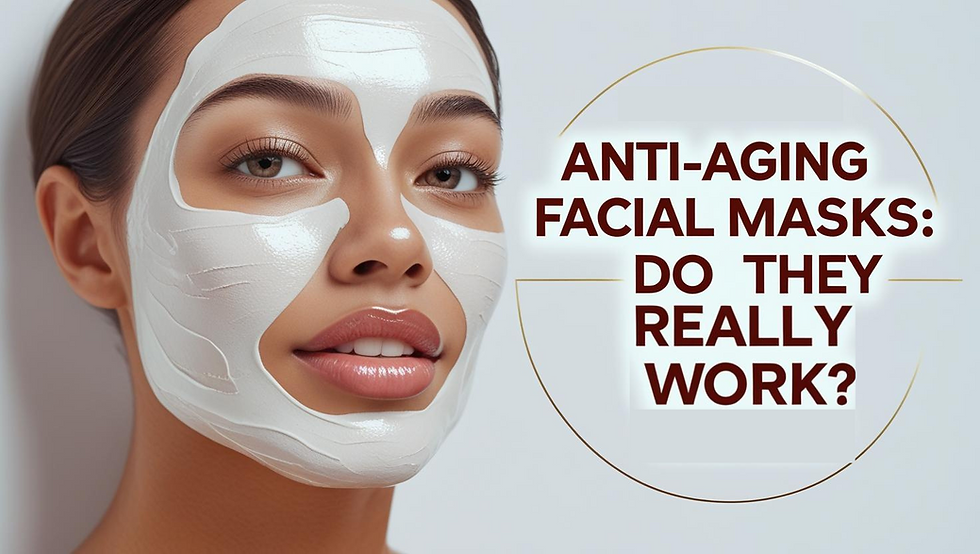Anti-Aging Facial Masks: Do They Really Work?
- asbfskincare
- Aug 21
- 4 min read

Aging is a natural process, but many people seek ways to slow down its visible effects. Fine lines, wrinkles, and loss of skin elasticity are common signs of aging that make us look older than we feel. This is where the beauty industry steps in with anti-aging products, particularly facial masks. But the big question remains: do anti-aging facial masks really work, or are they just another skincare trend?
This article will dive into the science, benefits, and limitations of anti-aging facial masks. We will look at the ingredients that make them effective, how they should be used, and what results you can realistically expect.
What Are Anti-Aging Facial Masks?
Anti-aging facial masks are skincare products formulated to reduce visible signs of aging. They typically come in the form of sheet masks, clay masks, gel masks, or cream-based treatments. Unlike regular moisturizers, masks are designed to sit on the skin for an extended period, allowing concentrated ingredients to penetrate more deeply.
These masks often contain active ingredients like hyaluronic acid, retinol, peptides, antioxidants, and natural extracts. Each of these components plays a role in hydrating, firming, or rejuvenating the skin.
How Do Anti-Aging Facial Masks Work?
The effectiveness of an anti-aging mask depends on its ingredients and how consistently it is used.
Hydration Boost Dehydrated skin tends to look older and more tired. Ingredients like hyaluronic acid help draw water into the skin, plumping it up and reducing the appearance of fine lines.
Collagen Stimulation Some masks contain peptides or retinol that encourage collagen production. Collagen is a protein responsible for skin’s firmness and elasticity, but its levels naturally decline with age. Boosting collagen can help skin look firmer and smoother.
Antioxidant Protection Free radicals from pollution and UV rays accelerate aging. Masks with antioxidants like vitamin C and green tea extract neutralize free radicals, protecting the skin from further damage.
Exfoliation Certain masks include mild exfoliating ingredients such as fruit enzymes or alpha hydroxy acids. These help remove dead skin cells, brighten the complexion, and allow newer, healthier skin to come to the surface.
Benefits of Anti-Aging Facial Masks
Immediate Results
One of the biggest attractions of anti-aging masks is their ability to provide instant results. After just one use, many people notice smoother, hydrated, and refreshed skin.
Non-Invasive Alternative
Compared to treatments like Botox or fillers, masks are affordable, non-invasive, and easy to use at home.
Customizable for Skin Type
Whether you have dry, oily, or sensitive skin, there is an anti-aging mask suited for your needs. This makes them accessible to almost everyone.
Relaxation and Self-Care
Aside from skin benefits, using a mask can be a calming ritual that reduces stress. Stress reduction itself can help slow the visible effects of aging.
Limitations of Anti-Aging Facial Masks
While facial masks offer visible benefits, it is important to understand their limitations.
Temporary Effects Most masks provide short-term improvements in hydration and plumpness. To maintain results, consistent use is necessary.
Not a Complete Solution Masks can enhance your skincare routine but cannot replace essentials like sunscreen, moisturizer, and a balanced diet.
Results Vary The effectiveness depends on skin type, age, and lifestyle habits. For example, someone in their 20s may see preventative benefits, while someone in their 50s may experience more subtle improvements.
Quality Matters Not all masks are created equal. Cheaper products may lack effective ingredients or use harsh chemicals that irritate the skin.
Key Ingredients That Make Anti-Aging Masks Effective
Hyaluronic Acid – Hydrates and plumps the skin.
Retinol – Encourages cell turnover and boosts collagen.
Peptides – Strengthen the skin barrier and improve elasticity.
Vitamin C – Brightens skin tone and protects from free radicals.
Niacinamide – Reduces fine lines and improves skin texture.
Green Tea Extract – Provides antioxidant protection.
Collagen – Helps restore skin firmness.
How to Use Anti-Aging Facial Masks Correctly
To maximize results, proper usage is key.
Cleanse First Always start with a clean face to ensure that the ingredients penetrate effectively.
Follow Instructions Do not leave the mask on for longer than recommended, as this can irritate the skin.
Use Consistently For best results, use an anti-aging mask 1 to 3 times per week, depending on the product.
Pair with a Routine Masks work best when combined with a consistent skincare routine, including sunscreen, serums, and moisturizers.
Do They Really Work? The Verdict
The short answer is yes, anti-aging facial masks do work, but within limits. They are not miracle products that erase wrinkles overnight. Instead, they should be seen as supportive tools in a broader skincare routine.
They hydrate, brighten, and temporarily reduce fine lines, giving skin a more youthful appearance. With consistent use and the right ingredients, they can also improve skin texture and help slow down visible aging.
However, long-term results depend heavily on overall skincare habits, diet, hydration, and sun protection. Masks are most effective when used alongside healthy lifestyle choices.
Conclusion
Anti-aging facial masks are not just a passing beauty trend. They offer genuine benefits like hydration, protection, and temporary wrinkle reduction. While they are not a substitute for professional treatments or a full skincare routine, they play a valuable role in maintaining youthful and healthy-looking skin. Contact this trusted facial mask exporter to order bulk quantity with cost-effective pricing and low MOQ requirements.
The key is to choose high-quality masks with proven ingredients, use them regularly, and combine them with other healthy skincare habits. In this sense, anti-aging facial masks truly do work, but their power lies in consistency and realistic expectations.




Comments